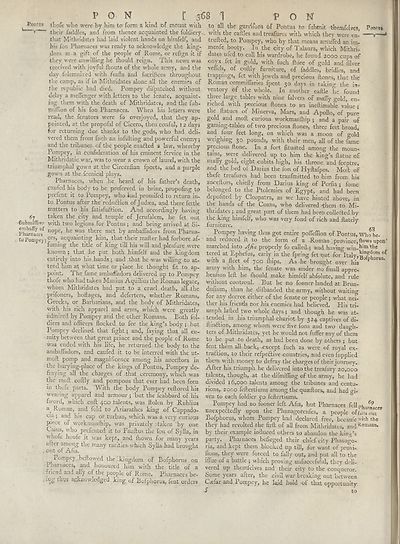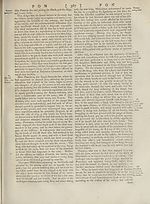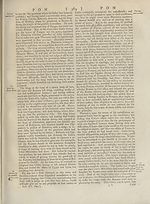Encyclopaedia Britannica > Volume 15, PLA-RAM
(410) Page 368
Download files
Complete book:
Individual page:
Thumbnail gallery: Grid view | List view

PON
Ponfus
, 67
SuDmiHive
tl\ofe wKo were by Kim to form a kind of mount with
their faddles, and from thence acquainted the foldiery
that Mithridates had laid violent hands on himfelf, and
his fon Pharnaces was ready to acknowledge the king¬
dom as a gift of the people of Rome, or refign it if
they were unwilling he ihould reign. This news was
received with joyful fhouts of the whole army, and the
day folemnized with feafts and facrifices throughout
the camp, as if in Mithridates alone all the enemies of
the republic had died. Pompey difpatched without
delay a meflenger with letters to the fenate, acquaint¬
ing them with the death of Mithridates, and the fub-
miffion of his fon Pharnaces. When his letters were
read, the fenators were fo overjoyed, that they ap¬
pointed, at the propofal of Cicero, then conful, 12 days
for returning due thanks to the gods, who had deli¬
vered them from fuch an infuiting and powerful enemy;
and the tribunes of the people enailed a law, whereby
Pompey, in confideration of his eminent fervice in the
Mithridatic war, was to wear a crown of laurel, with the
triumphal gown at the Circenfian fports, and a purple
gown at the.fcenical plays.
Pharnaces, when he heard of his father’s death,
caufcd his body to be preferved in brine, propofmg to
prelent it to Pompey, who had promifed to return in¬
to Pontus after the reduilion ofjudsea, and there fettle
matters to his fatisfaftion. And accordingly having
taken the city and temple of Jerufalem, lie fet out
with two legions for Pontus; and being arrived at Si-
Pharnaa'f noPe’ *ie was t^ere met ^7 ambaffadors from Pharna-
tpPonipej; ces\ acquainting him, that their mailer had forbore af-
’ fuming the title of king till his will and pleafuve were
known ; that he put both himfelf and the kingdom
entirely into his hands ; and .that he-was willing to at¬
tend him at what time or place he thought fit to ap¬
point. The fame ambaffadors delivered up to Pompey
thofe who had taken Manius Aquilius the Roman legate,
whom Mithridates had put to a cruel death, all .the
prifoners, holtages, and deferters, whether Romans,
Greeks, or Barbarians, and the body of Mithridates,
with his rich apparel and anus, which were greatly
admired by Pompey and the other Romans. Both fol-
dxers and officers flocked to fee the king’s body ; but
Pompey declined that fight; and, faying that all en¬
mity between that great prince and the people of Rome
was ended with his life, he returned the body to the
ambaffadors, and caufed it to be interred with the ut-
moll pomp and magnificence among his anceltors in
the burying-place of the kings of Pontus, Pompey de¬
fraying all the charges of that ceremony, which was
the moft coftly and pompous that ever had been feen
in thefe parts. W ith the body Pompey reftored his
wearing apparel and armour ; but the fcabbard of his
fword, which coft 400 talents, was flolen by Rublius
a. Roman, and fold to Ariarathes king of Cappado¬
cia ; and his cap or turban, which was a veiy curious
piece of workmanfhip, was privately ; taken by one
Caius, who prefented it to Fauftus the Ton of Sylla, in
vvhofe houfe it was kept, and ffiown for many years
after among the many rarities, which Sylla had broiurht
, out of Aha. b
Pompey bellowed the . kingdom of Bofph orus on
i narnaces, and honoured him with the title of a
friend and aLy of the people of Rome. Pharnaces be-
- T& Jkys acknowledged king of Bofphorus, fent orders
C 5O8 1
•p O N
PoMttfr
to all the gan-hons of Pohtus to fubtnit themfclves,
with the cailles and treafures with which they were en*
trufted, to Pompey, who by that means ainaffed an im-
menfe booty. In the city of Talaura, which Mithri¬
dates ufed to call his wardrobe, he found 2000 cups of
onyx let in gold, wdth fuch ftdre of gold and filver
veffels, of coftly furniture, of faddles, bridles, and
trappings, fet with jewels and precious ftenes, that the
Roman commilfaries fpent 30 days in taking the in*
ventory of the whole. In another caftle he found
three large tables with nine falvers of mafly gold, en¬
riched with precious Hones to an ineftimable va'lue ;
the ftatues of Minerva, Mars, and Apollo, of pure
gold and moft curious workmanfhip ; and a pair of
gaming-tables of two precious Hones, three feet broad,
and four feet long, on which was a moon of gold
weighing 30 pounds, with their men, all of the fame
precious Hone. In a fort fituated among the moun¬
tains, were delivered up to him the king’s ftatue of
niaffy gold, eight cubits high, his throne and feeptre,
and the bed of Darius the fon of Hyftafpes. Moft of
theft treafures had been tranfmitted to him from his
anceftors, chiefly from Darius king of Perlia ; fome
belonged to the Ptolemies of Egypt, and had been
depoflted by Cleopatra, as we have hinted above, in
the hands of the Coaiis, who delivered *them to Mi-
thndates ; and great part of them had been collected by
the king himfelf, who was very fond of rich and llately
furniture.
Pompey having thus got entire poffeffion of Pontus, Who be-
and reduced it to the form of a Rom&n province, flows upon*
marched into AJia properly fo called-; and having win-h!mthe
tered at Ephefus, early in the fpring fet out for Italy,
with a fleet of 7oo (hips. As he brought over hVBarfh“'"5-
army with him, the fenate was under -no fmall appre-
henfion left he ffiould make himfelf abfolute, and rule
v/ithout controul. But he no fooner landed at Brun-
dufium, than he difbanded the -army, without waitin''-
for any decree either of the fenate or people ; what nei¬
ther his friends nor his enemies had believed. His tri¬
umph lafted two whole days; and though he was at¬
tended in his triumphal chariot by 324 captives of di-
ftindtion, among whom were five fons and two daugh¬
ters of Mithndates, yet he would not fuffer any of them
to be put to death, as had been done by others ; but
fent them all back, except fuch as were of royal ex-
tradlion, to their refpe£live countries, and even fupplied
them with money to defray the charges of their journey.
After his triumph he delivered into the treafury 20,000
talents, though, at the difmiffing of the army, he had
divided 16,000 talents among the tribunes and centu¬
rions, 20C0 feftertiums among the quseftors, and had gi¬
ven to each foldier 50 feftertiums.
Pompey had no fooner left Afia, but Pharnaces fell phar^9a
unexpectedly upon the Phanagorenfes, a people offaiisout
Bofphorus, whom Pompey had declared free, becaufe with the
they had revolted the firft of all from Mithridates, and Ronian£*
by their example induced others to abandon the king’s
party. Pharnaces befieged their chief city Phanago-
na, and kept them blocked up till, for want of provi-
fions, they were forced to fally out, and put all to the
iffue* of a battle ; which proving unfuccefsful, they deli¬
vered up themielves and their city to the conqueror.
Some years after, the civil war breaking out between
Caefar and Pompey, he laid hold of that opportunity
$ to
Ponfus
, 67
SuDmiHive
tl\ofe wKo were by Kim to form a kind of mount with
their faddles, and from thence acquainted the foldiery
that Mithridates had laid violent hands on himfelf, and
his fon Pharnaces was ready to acknowledge the king¬
dom as a gift of the people of Rome, or refign it if
they were unwilling he ihould reign. This news was
received with joyful fhouts of the whole army, and the
day folemnized with feafts and facrifices throughout
the camp, as if in Mithridates alone all the enemies of
the republic had died. Pompey difpatched without
delay a meflenger with letters to the fenate, acquaint¬
ing them with the death of Mithridates, and the fub-
miffion of his fon Pharnaces. When his letters were
read, the fenators were fo overjoyed, that they ap¬
pointed, at the propofal of Cicero, then conful, 12 days
for returning due thanks to the gods, who had deli¬
vered them from fuch an infuiting and powerful enemy;
and the tribunes of the people enailed a law, whereby
Pompey, in confideration of his eminent fervice in the
Mithridatic war, was to wear a crown of laurel, with the
triumphal gown at the Circenfian fports, and a purple
gown at the.fcenical plays.
Pharnaces, when he heard of his father’s death,
caufcd his body to be preferved in brine, propofmg to
prelent it to Pompey, who had promifed to return in¬
to Pontus after the reduilion ofjudsea, and there fettle
matters to his fatisfaftion. And accordingly having
taken the city and temple of Jerufalem, lie fet out
with two legions for Pontus; and being arrived at Si-
Pharnaa'f noPe’ *ie was t^ere met ^7 ambaffadors from Pharna-
tpPonipej; ces\ acquainting him, that their mailer had forbore af-
’ fuming the title of king till his will and pleafuve were
known ; that he put both himfelf and the kingdom
entirely into his hands ; and .that he-was willing to at¬
tend him at what time or place he thought fit to ap¬
point. The fame ambaffadors delivered up to Pompey
thofe who had taken Manius Aquilius the Roman legate,
whom Mithridates had put to a cruel death, all .the
prifoners, holtages, and deferters, whether Romans,
Greeks, or Barbarians, and the body of Mithridates,
with his rich apparel and anus, which were greatly
admired by Pompey and the other Romans. Both fol-
dxers and officers flocked to fee the king’s body ; but
Pompey declined that fight; and, faying that all en¬
mity between that great prince and the people of Rome
was ended with his life, he returned the body to the
ambaffadors, and caufed it to be interred with the ut-
moll pomp and magnificence among his anceltors in
the burying-place of the kings of Pontus, Pompey de¬
fraying all the charges of that ceremony, which was
the moft coftly and pompous that ever had been feen
in thefe parts. W ith the body Pompey reftored his
wearing apparel and armour ; but the fcabbard of his
fword, which coft 400 talents, was flolen by Rublius
a. Roman, and fold to Ariarathes king of Cappado¬
cia ; and his cap or turban, which was a veiy curious
piece of workmanfhip, was privately ; taken by one
Caius, who prefented it to Fauftus the Ton of Sylla, in
vvhofe houfe it was kept, and ffiown for many years
after among the many rarities, which Sylla had broiurht
, out of Aha. b
Pompey bellowed the . kingdom of Bofph orus on
i narnaces, and honoured him with the title of a
friend and aLy of the people of Rome. Pharnaces be-
- T& Jkys acknowledged king of Bofphorus, fent orders
C 5O8 1
•p O N
PoMttfr
to all the gan-hons of Pohtus to fubtnit themfclves,
with the cailles and treafures with which they were en*
trufted, to Pompey, who by that means ainaffed an im-
menfe booty. In the city of Talaura, which Mithri¬
dates ufed to call his wardrobe, he found 2000 cups of
onyx let in gold, wdth fuch ftdre of gold and filver
veffels, of coftly furniture, of faddles, bridles, and
trappings, fet with jewels and precious ftenes, that the
Roman commilfaries fpent 30 days in taking the in*
ventory of the whole. In another caftle he found
three large tables with nine falvers of mafly gold, en¬
riched with precious Hones to an ineftimable va'lue ;
the ftatues of Minerva, Mars, and Apollo, of pure
gold and moft curious workmanfhip ; and a pair of
gaming-tables of two precious Hones, three feet broad,
and four feet long, on which was a moon of gold
weighing 30 pounds, with their men, all of the fame
precious Hone. In a fort fituated among the moun¬
tains, were delivered up to him the king’s ftatue of
niaffy gold, eight cubits high, his throne and feeptre,
and the bed of Darius the fon of Hyftafpes. Moft of
theft treafures had been tranfmitted to him from his
anceftors, chiefly from Darius king of Perlia ; fome
belonged to the Ptolemies of Egypt, and had been
depoflted by Cleopatra, as we have hinted above, in
the hands of the Coaiis, who delivered *them to Mi-
thndates ; and great part of them had been collected by
the king himfelf, who was very fond of rich and llately
furniture.
Pompey having thus got entire poffeffion of Pontus, Who be-
and reduced it to the form of a Rom&n province, flows upon*
marched into AJia properly fo called-; and having win-h!mthe
tered at Ephefus, early in the fpring fet out for Italy,
with a fleet of 7oo (hips. As he brought over hVBarfh“'"5-
army with him, the fenate was under -no fmall appre-
henfion left he ffiould make himfelf abfolute, and rule
v/ithout controul. But he no fooner landed at Brun-
dufium, than he difbanded the -army, without waitin''-
for any decree either of the fenate or people ; what nei¬
ther his friends nor his enemies had believed. His tri¬
umph lafted two whole days; and though he was at¬
tended in his triumphal chariot by 324 captives of di-
ftindtion, among whom were five fons and two daugh¬
ters of Mithndates, yet he would not fuffer any of them
to be put to death, as had been done by others ; but
fent them all back, except fuch as were of royal ex-
tradlion, to their refpe£live countries, and even fupplied
them with money to defray the charges of their journey.
After his triumph he delivered into the treafury 20,000
talents, though, at the difmiffing of the army, he had
divided 16,000 talents among the tribunes and centu¬
rions, 20C0 feftertiums among the quseftors, and had gi¬
ven to each foldier 50 feftertiums.
Pompey had no fooner left Afia, but Pharnaces fell phar^9a
unexpectedly upon the Phanagorenfes, a people offaiisout
Bofphorus, whom Pompey had declared free, becaufe with the
they had revolted the firft of all from Mithridates, and Ronian£*
by their example induced others to abandon the king’s
party. Pharnaces befieged their chief city Phanago-
na, and kept them blocked up till, for want of provi-
fions, they were forced to fally out, and put all to the
iffue* of a battle ; which proving unfuccefsful, they deli¬
vered up themielves and their city to the conqueror.
Some years after, the civil war breaking out between
Caefar and Pompey, he laid hold of that opportunity
$ to
Set display mode to:
![]() Universal Viewer |
Universal Viewer | ![]() Mirador |
Large image | Transcription
Mirador |
Large image | Transcription
Images and transcriptions on this page, including medium image downloads, may be used under the Creative Commons Attribution 4.0 International Licence unless otherwise stated. ![]()
| Encyclopaedia Britannica > Encyclopaedia Britannica > Volume 15, PLA-RAM > (410) Page 368 |
|---|
| Permanent URL | https://digital.nls.uk/191906106 |
|---|
| Attribution and copyright: |
|
|---|
| Description | Ten editions of 'Encyclopaedia Britannica', issued from 1768-1903, in 231 volumes. Originally issued in 100 weekly parts (3 volumes) between 1768 and 1771 by publishers: Colin Macfarquhar and Andrew Bell (Edinburgh); editor: William Smellie: engraver: Andrew Bell. Expanded editions in the 19th century featured more volumes and contributions from leading experts in their fields. Managed and published in Edinburgh up to the 9th edition (25 volumes, from 1875-1889); the 10th edition (1902-1903) re-issued the 9th edition, with 11 supplementary volumes. |
|---|---|
| Additional NLS resources: |
|

